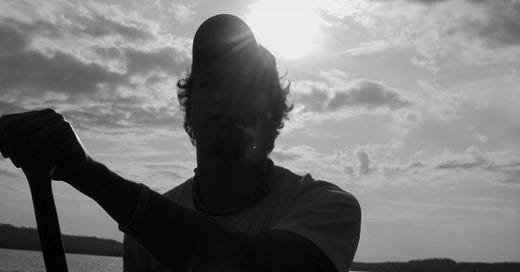Thank you. I’ve got to say that first. When I started writing this newsletter, I wasn’t sure anyone would care to read it . . . but over the last eight months it’s led to some great conversations, some deep rabbit holes, and a newfound respect for blind faith. Also, it has made the often lonely business of writing a lot more fun.
Surprising exactly no one, I was voted “most laid back” in high school. I also heard—this from almost every teacher—that I was “not fulfilling my potential as a student.” While at the time these seemed like unrelated items in an otherwise unremarkable path to graduation, it turns out they are exactly the same thing.
Our nature, obviously, cannot be changed: being born laid-back or uptight, left-brained, right-brained, black or white. These things are out of our hands—how we use these fixed traits, though, that’s the key.
Coasting through high school, I had embraced going with the flow, wearing that laissez-faire attitude like some lazy badge of honor. However, when it came time to make something of myself, post-graduation, it suddenly felt like a curse, like I was a person born without conviction. And it took flailing around for the better part of a decade to realize the truth that I’d rather observe what’s going on around me than intervene, not from avoidance but more a curiosity of how things will play out without my influence. The trick, I eventually understood, was in learning how to embrace my nature and put it to good use.
I’ve come to learn many writers are like this. In The Electric Kool-Aid Acid Test, Tom Wolfe immortally detailed the late ‘60s scene, Ken Kesey and his Merry Pranksters, the Grateful Dead, and they say he was a complete fly on the wall, noting everything that happened without much input at all, producing, in turn, an unrivaled assay of the times.
Perhaps to you go-getters, this seems like a passive way to approach the world, even if it occasionally churns out literary gems, but I’d argue it’s an intentional passivity, purpose-driven in its own right. Because pulled off successfully, it requires keeping your hand on the wheel with a clear direction in mind.
In a letter to a friend asking for some advice, a 22-year-old Hunter S. Thompson wrote this about picking your path through life: a man who procrastinates in his choosing will inevitably have his choice made for him by circumstance. In my younger days, circumstance ran the navigation.
If that makes it sound like I’ve got things figured out now, I don’t—but I’ve certainly gotten a better handle on where I want to go. Which raises an entirely different question: how much control over our lives do we even have? This makes me think of Reinhold Niebuhr’s Serenity Prayer:
God, grant me the serenity to accept the things I cannot change,
the courage to change the things I can,
and the wisdom to know the difference.The older I get, the more I see that control is an illusion, a fallacy, a fantasy, an imaginary plaything. It’s not real. To prove it, pay attention to how many people remain utterly desperate for control: the manager making you come in on a Saturday to crunch out a few more TPS reports, flexing just because they can. Or maybe it’s the white lady accosting a black birdwatcher in the park because he doesn’t “look like he belongs.” When people realize they can’t control their own lives, they try to control everyone else’s.
The desperation is so strong that people squeeze for every bit of control until the sand has slipped through their clenched fingers, but this—this—is the moment everything can change.
The Roman emperor Marcus Aurelius wrote: You have power over your mind—not outside events. Realize this, and you will find strength. In other words, you don’t control what happens, you only control how you respond.
As for controlling my response to outside events, I have one goal—no regrets. This isn’t about limiting FOMO or living life to the fullest, it’s not even about picking a path of purpose. No, this is about taking life as it comes; understanding that both the good things and the bad things had to happen to get you here. Change one thing and it would all be different. So when it’s good, you must be grateful for all of it. And when it’s bad—well, like George Harrison said, all things must pass—so it’ll eventually get good again, and then it’s back to gratitude for the long and winding road. No regrets.
Radical acceptance of everything that happens—that’s probably the most hardcore thing anyone could do. Once false hope for control is purged out of your system, you might realize there was nothing there to begin with, nothing you really have control over beyond your own mind. And then, finally, you are free.
So here's to fighting like hell for what you can control, and letting the rest happen as it will.
-Martin






I needed to read this one today. Thank you. ❤️
Very insightful! I do feel the only thing we can control is ourself. Do right or wrong, be a giver or taker, live a healthy life or or something less. An individuals commitments, beliefs and actions can certainly impact and change the lives of others. Danny Thomas-St. Judes, Frank Silva-Tunnel to Towers, MLK and many others have certainly impacted the world around us and changed the hearts and minds of many. Continue pursuing your passion and you'll be amazed at the lives you impact. I'm looking forward to enjoying more of your writings....